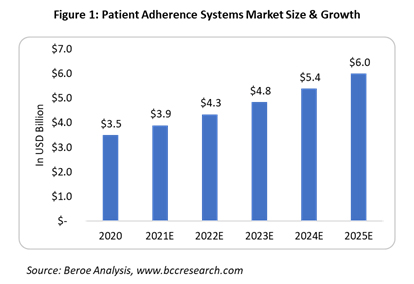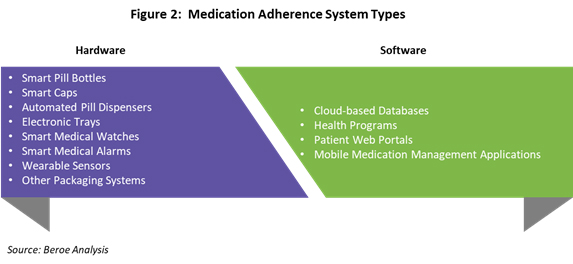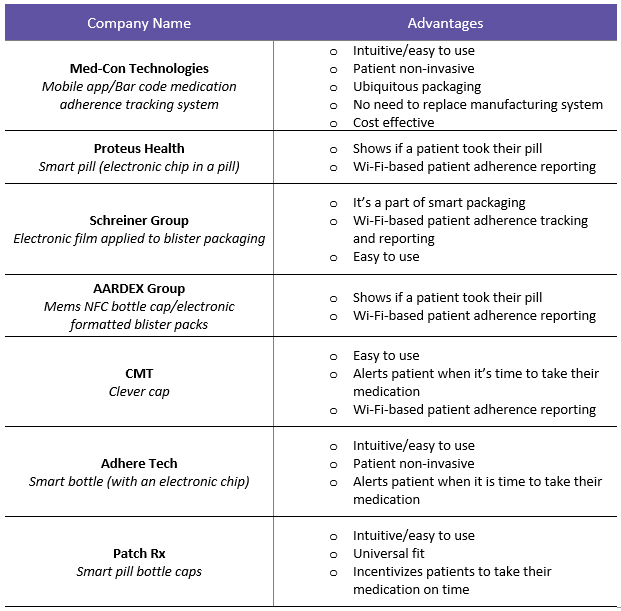Trends In Decentralized Clinical Trial Remote Monitoring For Medication Adherence
By Mathini Ilancheran and Anthony Londino
 Today in clinical research and development, the patient has become the priority. The processes of accessing clinical trial information and participating in clinical trials need to be simple and easy. In recent years, there has been a lot of talk about patient-centricity and patient engagement. These are no longer just idle words; they have become the ecosystem through which pharmaceutical companies develop and deliver new life-saving drugs, and technology is just the conduit to help pharma do this.
Today in clinical research and development, the patient has become the priority. The processes of accessing clinical trial information and participating in clinical trials need to be simple and easy. In recent years, there has been a lot of talk about patient-centricity and patient engagement. These are no longer just idle words; they have become the ecosystem through which pharmaceutical companies develop and deliver new life-saving drugs, and technology is just the conduit to help pharma do this.
In addition to treating patients as a priority, an emphasis on operational efficiency and improved data remains key to reducing human errors, data duplication, and costs and speeding up the process to get new drugs to market.
As a result of the COVID-19 pandemic, pharma companies are looking to use technology to make clinical trials less site-centric and more patient-centric, decentralized, digitized, and diversified. With the successful implementation of real-time remote monitoring technology, they will be able to do more remote studies that require patients to visit sites less frequently. This will remove the burden on patients and improve patient recruitment and retention, while bringing greater potential for success in clinical trials. In this article, we focus on the patient medication adherence market and highlight a few innovative players within this industry.
Patient Medication Adherence System Market Trends
The patient adherence systems and technologies market is valued at $4.3 billion in 2022 and is expected to grow at a CAGR of 11.4% by 2025 (Figure 1).1

The COVID-19 pandemic demonstrated the risk involved in patient medication non-adherence. The prevailing chronic diseases and the need to manage them effectively will increase the market demand further. Within this category there are both hardware- and software-based systems. Figure 2 below illustrates the system types with examples of adherence technologies in the market.

Key category trends to highlight within the patient adherence category include:
- Smart Boxes/Caps: Using electronic technology for medication adherence monitoring during trials is on the rise. Schreiner’s therapy monitoring technology consists of smart blister packs and smart kit boxes with sensor technology linked to its software, which provides real-time information regarding the dosing history.2 Smart pill bottle caps that track when a patient takes the medication are trending. The clinical team can access this data through the web application and remind the patient in case of non-adherence.
- Wearables: Wearable devices help in tracking and monitoring of patients and record real-time data, which helps pharma companies to determine patient progress and provide personalized care. However, this technology does not monitor patient medication adherence.
- Mobile Applications: Mobile health applications provide real-time access that supports patient engagement. Branded patient engagement mobile apps with customization and behavior modification tools as per pharma requirements can deliver value to all stakeholders and raise the profile of the sponsoring company.
- Telehealth Programs: Telehealth is gaining momentum. These programs are a popular alternative to a traditional healthcare setting. Next-generation telehealth medicine includes a telemedicine cart and software to manage, analyze, and visualise patient data.
- Digital Support: Pharma is actively adopting new technologies and increasing use of e-prescribing for distributing co-pay offset programs. Social media has become the new channel for providing coupon codes for patients. Text messages and e-mails are used for refill reminders and for providing educational material.
Patient Medication Adherence And Behavior Smart Monitoring Companies
The supply market for patient adherence systems consists of three main types of suppliers who can assist sponsors with patient adherence programs: full-service, niche players/specialists/start-ups, and CROs. Suppliers are moving toward building service capabilities to provide the whole suite of patient access solutions. Supplier trends can be seen varying in response to the pandemic with increasing capacity and M&As, and this is expected to continue through the end of 2022.
Full-service providers have a strong hold on pharmacy services and are developing niche capabilities through mergers and acquisitions. CROs have been providing health program services through various phases of clinical trials, with a focus on late-phase trials. Large CROs have developed the capability to provide patient support programs due to the knowledge gained through their drug development, drug efficacy studies, and patient recruitment experience. However, the most innovative are the niche suppliers, which have been developing innovative methodologies to improve patient adherence through patient support programs.
The table below provides examples of the trending innovative patient medication adherence and behavior measurement companies:

Conclusion
It is important to note that not all patient adherence measurement systems are cost effective. The shipping and handling supply chain is an added cost for the pharma company. In certain cases, there is a need for pharmas to replace their manufacturing systems to accommodate a new technology. Another component to factor in is the sustainable nature of the product. For example, electronic film used in packaging material may not be environmentally friendly and is costly to dispose of or repurpose. Another important consideration is patient invasiveness; some systems are “patient invasive,” requiring the patient to perform additional activities that are not part of their normal daily routine. Hence, it is important for pharma companies to pick the right system that is the best fit for their manufacturing process.
References
- BCC Publishing, “Medication Adherence: Systems, Technologies and Global Markets,” BCC Research, March 2021. [Online]. Available: https://www.bccresearch.com/market-research/pharmaceuticals/medication-adherence-systems-technologies-and-global-markets.html. [Accessed January 2022].
- “Monitoring of Medication Adherence,” Schreiner Group, March 2021. [Online]. Available: https://www.schreiner-group.com/en/press/detail/schreiner-medipharm-and-aardex-offer-smart-digital-therapy-management-solution-for-clinical-trials.html. [Accessed January 2022].
- SOTI, “U.S. Consumer Survey: Physicians Using Mobile Apps Seen as a Major Differentiator Amongst U.S. Patients,” SOTI , June 2019. [Online]. Available: https://soti.net/resources/newsroom/2019/us-consumer-survey-physicians-using-mobile-apps-seen-as-a-major-differentiator-amongst-us-patients. [Accessed January 2022].
About The Authors:
 Mathini Ilancheran is the principal analyst of R&D for Beroe Inc. She specializes in understanding market scenarios across the globe in the outsourcing arena. Her analysis has enabled global fortune 500+ companies in their strategic decisions on supply base optimization, risk reduction, innovation and efficient sourcing. She has written for several publications related to R&D procurement opportunities. With her category knowledge, she has published 35+ articles in leading journals, co-authored with industry experts. She has a master's in management from University College London (UCL) and has worked as a consultant in the U.K. You can contact her at mathini.ilancheran@beroe-inc.com and connect with her on LinkedIn.
Mathini Ilancheran is the principal analyst of R&D for Beroe Inc. She specializes in understanding market scenarios across the globe in the outsourcing arena. Her analysis has enabled global fortune 500+ companies in their strategic decisions on supply base optimization, risk reduction, innovation and efficient sourcing. She has written for several publications related to R&D procurement opportunities. With her category knowledge, she has published 35+ articles in leading journals, co-authored with industry experts. She has a master's in management from University College London (UCL) and has worked as a consultant in the U.K. You can contact her at mathini.ilancheran@beroe-inc.com and connect with her on LinkedIn.
 Anthony Londino has more than 30 years of leadership experience working with Fortune 100 companies; the last 12 were directly in the pharmaceutical clinical trial space.
Anthony Londino has more than 30 years of leadership experience working with Fortune 100 companies; the last 12 were directly in the pharmaceutical clinical trial space.
